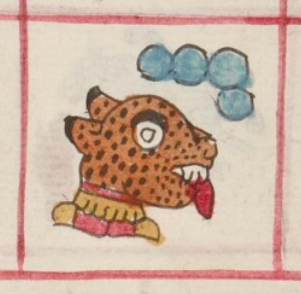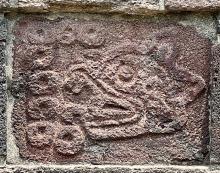Nahui Ocelotl (TR15v)
Nahui Ocelotl (TR15v)
This combined simplex glyph and notation produces the date Four Jaguar (Nahui Ocelotl). It is boxed in, as dates often are, with red lining. Nahui Ocelotl is a day sign in the 260-day divinatory calendar called the tonalpohualli. Calendrics played a significant role in Nahuas' religious views of the cosmos.
Inside the box a four circles painted turquoise blue. The ones are not in a straight line; they are three across the top and one hanging down. Below and to the left of the ones is the head of a jaguar, shown in profile and facing toward the viewer's right. Its coat is orange with small black spots. Its ears are short and have a black edging. Its eye is white, wide open, and has a black eyebrow. Its mouth is slightly open, with white teeth showing, and a long red tongue protruding. At the animal's neck is a yellow scalloped edging, as though the head has been severed. Below that appears to be some red and yellow organs exposed.
Stephanie Wood
Organs, as shown below, typically come in red and yellow. Scalloped yellow edges can suggest a severing, such as can be seen in the severed part of the tree of Tamoanchan (also below). The autonomous-era sculpture of the divine force of Coyolxauhqui, who was cut into many pieces, has these scalloped edges all over it. For more on red and yellow interiors, see the article on the left navigation bar.
Stephanie Wood
ca. 1550–1563
Jeff Haskett-Wood
organs, severing, órganos de cuerpo, bordes cortados, días, days, fechas, dates, calendarios, calendars
This example of a carved stone hieroglyph representing the date Chicuei Ocelotl (Eight Jaguar, or 8-Jaguar) shows the head of a jaguar in profile, facing left. Its mouth is open, with teeth visible and tongue protruding. It seems to have spots on its cheek. So, it is something like the glyph above, although the numerical components are different. The stone carving is located on the Templo Calendárico at the Tlatelolco archaeological site. Photo by R. Haskett, 2 May 2025.

nahui, four, https://nahuatl.wired-humanities.org/content/nahui
ocelo(tl), a jaguar (Felis onca), or an ocelot (Felis pardalis), https://nahuatl.wired-humanities.org/content/ocelotl
Cuatro-Jaguar, o 4-Jaguar
Stephanie Wood
Available at Digital Florentine Codex/Códice Florentino Digital, edited by Kim N. Richter and Alicia Maria Houtrouw, "Book 10: The People", fol. 39v, Getty Research Institute, 2023. https://florentinecodex.getty.edu/en/book/10/folio/39v/images/0 Accessed 10 September 2025
Images of the digitized Florentine Codex are made available under the following Creative Commons license: CC BY-NC-ND (Attribution-NonCommercial-NoDerivs 4.0 International). For print-publication quality photos, please contact the Biblioteca Medicea Laurenziana ([email protected]). The Library of Congress has also published this manuscript, using the images of the World Digital Library copy. “The Library of Congress is unaware of any copyright or other restrictions in the World Digital Library Collection. Absent any such restrictions, these materials are free to use and reuse.”




